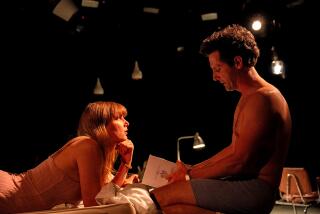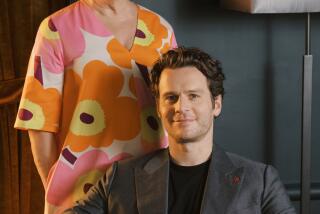Review: ‘Heart of Robin Hood’ walks (and runs, and occasionally trips) along a new path in Sherwood Forest
- Share via
Deep in “The Heart of Robin Hood,” a production by the Icelandic company Vesturport, Maid Marion confesses to her sidekick/BFF Pierre that she has fallen in love with the outlaw Robin Hood.
“But he’s brutish and emotionally unavailable,” Pierre replies.
This psychological insight may be anachronistic, but it’s dead-on, at least in David Farr’s revisionist script about the old English legend, which premiered in London in 2011 is now at the Wallis Annenberg Center for the Performing Arts in Beverly Hills.
Farr’s Robin Hood, played here by the shirtless, brooding, looks-amazing-in-leather-pants Luke Forbes, steals from the rich in Sherwood Forest, just as you’ve heard — but he doesn’t give to the poor. That part’s just a romantic rumor that has reached Marion (Christina Bennett Lind), the daughter of the Duke of York, who spends her time chafing — as all sympathetic fairy-tale heroines of marriageable age must nowadays — against marriage.
Marion’s father is away with King Richard at the Crusades, and the king’s evil brother Prince John (Eirik del Barco Soleglad) is in town, scheming to find a bride and tax the peasants. Marion’s screechy little sister, Alice (Sarah Hunt), is desperate for Marion to marry John — or anybody — so that she can get married. Marion finds the whole situation so frustrating that she beats up her music teacher, Pierre (Daniel Franzese), with a lute, and then persuades him to escape into the forest with her.
The runaways search out the Merry Men, who prove gorgeous and athletic but not as noble as Marion expected. In fact, they’re thuggish misogynists — Robin most of all. So Marion dresses up as a man, calls herself Martin of Sherwood and with Pierre’s help begins stealing from the rich and giving to the poor herself.
Faced with this competition, Robin Hood challenges Martin to a fight (failing to recognize him as a woman in spite of the revealing bustier he wears) — but first they must team up to save two adorable children from Prince John.
A lot of this plotting is familiar — at times tediously so. Writers have been revising folktales for centuries now, and the trope of the damsel in distress is so old-fashioned — especially in the wake of films like “Shrek” and “Brave” in which the damsels are way tougher than their suitors. The supportive “Hey, girls can fight too!” tone of Farr’s script feels more condescending than iconoclastic.
Nobody onstage seems to realize the cliché of a girl dressing up as a boy to demonstrate that gender roles are constructed. Ditto the idea of a saintly woman helping a gloomy megalomaniac find his tender heart, that staple of Harlequin romances, which is trotted out here as triumphantly as if it were radical feminism.
Marion’s feelings for Robin aren’t justified by any quality beyond his cut abs, and if she were a more appealing character we might worry about her getting into an abusive relationship. But all the people onstage, even the ones we’re supposed to like, display a whiny self-absorption that often makes them unsympathetic. They’re all also oddly cavalier about murder and corpses, which they frequently use as props, for laughs.
Directors Gisli Örn Gardarsson and Selma Björnsdóttir attempt to divert focus from the uneven, brittle humor with Cirque du Soleil-style stunts. The performers are so busy sliding, leaping, running, bursting out of bodies of water, flipping and dangling from ropes, joking all the while, that they’re never quite on solid ground, emotionally.
Their greatest obstacle in this regard may be Börkur Jónsson’s set, which has a 40-foot-tall, steeply raked, carpeted wall at the back. Characters enter by sliding down it, barreling toward the audience at an impressive clip. To climb back up it, in order to get onto one of the drawbridge-like platforms that sometimes pop out of it, they need a running start. The wall is attractive, in shades of green to evoke the oak forest, and it’s interesting conceptually, at least at first. But each slide seems a bit less magical and beside the point.
The same is true of the music, composed and performed live by the adorable Icelandic pop star Salka Sól. She opens the show with her lovely, husky voice and puckish lyrics and pops back onstage at regular intervals, even taking part in the action — but the more she appears, the less relevant she seems.
“The Heart of Robin Hood” is a mixture of promising elements that don’t quite work together. It jumps around a lot but never finds its own heart.
SIGN UP for the free Essential Arts & Culture newsletter »
♦ ♦ ♦ ♦ ♦ ♦ ♦ ♦ ♦ ♦
‘The Heart of Robin Hood’
Where: Wallis Annenberg Center for the Performing Arts, 9390 N. Santa Monica Blvd., Beverly Hills
Where: 7:30 p.m. Tuesdays-Sundays, 2 p.m. Saturdays and Sundays; ends Dec. 17
Tickets: $35-$105
Info: (310) 746-4000, www.thewallis.org
Running time: 2 hours
See all of our latest arts news and reviews at latimes.com/arts.
MORE THEATER:
Cornerstone’s nine-play cycle on hunger finds inspiration in Mozart
How ‘The Band’s Visit’ turns song, speech and silence into stage poetry
Michael Luwoye: Once a theater outsider, now he’s Hamilton — in L.A., and soon on Broadway
More to Read
The biggest entertainment stories
Get our big stories about Hollywood, film, television, music, arts, culture and more right in your inbox as soon as they publish.
You may occasionally receive promotional content from the Los Angeles Times.










